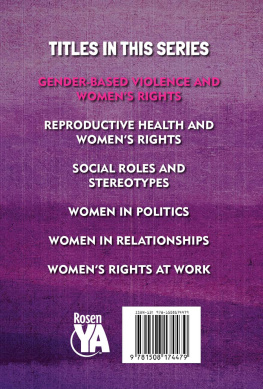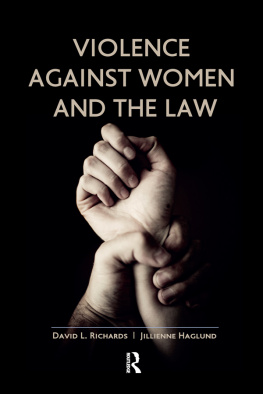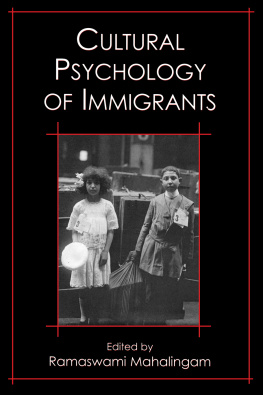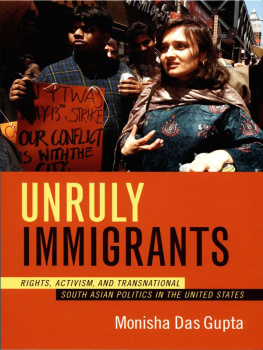Thank you for buying this ebook, published by NYU Press.
Sign up for our e-newsletters to receive information about forthcoming books, special discounts, and more!
Sign Up!
About NYU Press
A publisher of original scholarship since its founding in 1916, New York University Press Produces more than 100 new books each year, with a backlist of 3,000 titles in print. Working across the humanities and social sciences, NYU Press has award-winning lists in sociology, law, cultural and American studies, religion, American history, anthropology, politics, criminology, media and communication, literary studies, and psychology.
Violence Against Latina Immigrants
Violence Against Latina Immigrants
Citizenship, Inequality, and Community
Roberta Villaln
NEW YORK UNIVERSITY PRESS
New York and London
www.nyupress.org
2010 by New York University
All rights reserved
Library of Congress Cataloging-in-Publication Data
Villaln, Roberta.
Violence against Latina immigrants :
citizenship, inequality, and community / Roberta Villaln.
p. cm.
Includes bibliographical references and index.
ISBN-13: 9780814788233 (cl : alk. paper)
ISBN-10: 0814788238 (cl : alk. paper)
ISBN-13: 9780814788240 (pb : alk. paper)
ISBN-10: 0814788246 (pb : alk. paper)
[etc.]
1. Women immigrantsViolence againstUnited States.
2. Latin AmericansViolence againstUnited States. 3. Women immigrants
United StatesSocial conditions. 4. Latin AmericansUnited StatesSocial
conditions. 5. United StatesEmigration and immigrationSocial aspects.
I. Title.
HV6250.4.W65V5214 2010
362.83dc22 2009053608
New York University Press books are printed on acid-free paper,
and their binding materials are chosen for strength and durability.
We strive to use environmentally responsible suppliers and materials
to the greatest extent possible in publishing our books.
Manufactured in the United States of America
c 10 9 8 7 6 5 4 3 2 1
p 10 9 8 7 6 5 4 3 2 1
For all survivors of violence
and
For Beatriz and Isabella
Contents
Acknowledgments
I would like to express my gratitude to all the people and institutions that have made the creation of this book possible. First and foremost, I am indebted to the immigrant survivors of violence and the nonprofit advocates who were willing to share their stories and experiences with me; without them, this book would serve no purpose.
I am also thankful for my mentor, Peter Ward, whose trust and support allowed me to pursue my studies at the University of Texas at Austin. At this institution, I was fortunate to work with a group of exceptional professors among whom I would especially like to thank Sharmila Rudrappa, who inspired and guided this research; Gideon Sjoberg, with whom I shared many hours of invaluable conversation on social theory; Michael Young, who never hesitated to push me forward; and Charles Hale, Bryan Roberts, and Henry Dietz, who accompanied me from my early days as a graduate student in Latin American studies until the completion of my Ph.D. in sociology. I was able to develop my research due to the generosity of the Department of Sociology Fellowship and the Graduate Editorial Fellowship for the Latin American Research Review at the University of Texas at Austin. I also found collegial and institutional support as a professor at my new home, Saint Johns University in Queens, New York, where Dawn Esposito, Ino Rossi, and Natalie Byfield were particularly encouraging, and where I was twice awarded a grant under the Summer Support of Research Program. The work by my editor, Ilene Kalish, and her assistant, Aiden Amos, at New York University Press and thoughtful comments from anonymous reviewers have also been fundamental for the development of this project.
My family and friends were vital as wellpor siempre, gracias.
1
Introduction
Theoretical and
Methodological Approach
Angela, Claudia, Julia, Luisa, Laura, Martha, Rosa, Manuela, Ana, Susana, Clara, Silvana, Rosario, Mnica, Samuel, Yolanda, Patricia, Ramona, and Leticia were all immigrants. With or without immigration documents, they had all left their native lands to help their families survive. In love, and in pain, they had all endured intimate partner violence in the United States. Courageously and fearfully, they had all tried to break free from their abusive relationships and sought help. Some found their way out. Others did not. In this book, I explore the disparate fates of Latina battered immigrants in their search for nonviolence, autonomy, and citizenship by uncovering and defying entrenched discriminatory principles and practices still at work in this country from a feminist of color perspective.
Latina, black, postcolonial, and critical race feminisms have been particularly acute in their contribution to the struggle to end violence against women. As the battered womens movement developed, and violence against women was redefined first as a social problem (as opposed to an acceptable private matter)
In this spirit, I developed activist researchbut also tend to be reproduced by nonprofit workers. This results in the exclusion of the most underprivileged immigrants (those Latina immigrants who are women of color, extremely poor, with few years of formal education, undocumented, in relationships with residents or other undocumented immigrants, originally from Mexico, homosexual, and/or unable to fit within normal standards of civil behavior) regardless of their histories of abuse.
My analysis of how and why the most disadvantaged battered Latina immigrants are left unprotected and my suggestions on how to turn this around are based on activist research at a legal nonprofit organization that I will call the Organization for Refugees of America/Organizacin para Refugiados de Amrica (ORA). ORA proved to be an excellent example of how extreme cases contribute to the understanding of the construction of difference and normalcy, marginality and dominance,
I worked for two years as a part-time volunteer intern in the ORAs battered immigrant assistance program, which provided legal services free of charge to low-income immigrants who qualified as applicants for citizenship under VAWA and VTVPA. As such, I worked with ORA staff in providing services to immigrants, including screening interviews on the phone and in person, collection and translation of immigration and abuse histories, translation from Spanish to English of affidavits and supporting documentation related to the cases, preparation of immigration forms and citizenship applications, and other on-demand tasks. My direct participation in these activities allowed me to gather data about the ways in which immigrants presented themselves; talked and wrote about their experiences of migration and violence; expressed their demands and concerns about going through the application for citizenship; showed their feelings, fears, frustrations, and hopes; made sense of their situations; and reacted to the formal and informal requirements of the application process. Furthermore, my participation also allowed me to observe the legal assistants, attorneys, and other ORA staff in their interactions with the immigrants (or clients, as they were called in the organization), such as how ORA staff expressed themselves, the verbal and body language they used with the clients and with their coworkers, their reactions to the histories of abuse, and their attitudes toward law enforcement officers and immigration authorities. I also participated in meetings related to immigration and womens issues to which ORA staff were invited on a regular basis (such as meetings on legal advocacy and violence against women), which made it possible for me to collect primary data on how legal and social workers organize their activities and modify their services on the basis of changes in legislation and one anothers work experiences (e.g., in their discussions about successful or complex cases, or their conversations about lobbying activities). After my workday, I recorded my field observations in journal form, including not only immigrants and staff members stories but also my own role, feelings, and thoughts.







